Table of Contents
Get started with MyPerfectResume today!
- Build a resume on any device
- Pick an ATS-friendly template
- Tailor with AI copy suggestions
Why this resume works
- Quantifies accomplishments: By reducing absenteeism by 20% and achieving 95% immunization compliance, the applicant’s quantified accomplishments paint a clear picture of strong healthcare management.
- Showcases career progression: Progressing from a community health advisor to a school health coordinator, the applicant’s journey reflects escalating responsibilities and expertise in pediatric care and wellness programs.
- Illustrates problem-solving ability: Implementing new safety protocols that lowered incidents showcases the applicant’s problem-solving skills and proactive approach toward improving community health standards.
More School Nurse Resume Examples
Explore these school nurse resume examples to learn how to highlight your healthcare expertise, communication skills, and experience working with students. Use these samples to create a resume tailored for school nursing roles.
Entry-level school nurse
Why this resume works
- Centers on academic background: Academic accomplishments like graduating from a master’s program in nursing reflects the applicant’s strong educational foundation.
- Effective use of keywords: Strategically incorporating role-specific terms such as pediatric care, emergency response, and health program development ensures the resume has the correct keywords that optimize it for ATS systems.
- Sections are well-organized: Effective use of bullet points and headers makes the resume easy to scan, ensuring key achievements are quickly accessible and improving readability.
Mid-level school nurse
Why this resume works
- Points to measurable outcomes: By showcasing a 30% increase in health record efficiency and a 20% reduction in absenteeism, the applicant shows their powerful contributions to improved school health systems.
- Displays technical expertise: Holding certifications such as certified pediatric nurse and advanced cardiac life support reveals the applicant’s robust technical expertise essential for delivering high-quality healthcare services.
- Includes a mix of soft and hard skills: Combining interpersonal skills with clinical assessment and team coordination, the applicant presents a well-rounded skill set ideal for patient-focused roles.
Experienced school nurse
Why this resume works
- Lists relevant certifications: By including certifications like Certified Pediatric Nurse and Basic Life Support, the applicant showcases dedication to mastering important healthcare skills.
- Focuses on work history: The chronological resume format effectively highlights extensive work history, presenting a clear progression through roles like school nurse and pediatric health specialist.
- Emphasizes leadership skills: Managing student health records and implementing wellness programs demonstrates strong leadership skills, showcasing the applicant’s ability to lead powerful initiatives.
School Nurse Resume Template (Text Version)
Chris Nguyen
Louisville, KY 40203
(555)555-5555
Chris.Nguyen@example.com
Professional Summary
Experienced School Nurse with expertise in pediatric healthcare and wellness initiatives. Proven record in improving student health outcomes through proactive programs and community engagement. Skilled in managing health protocols with a focus on safety and immunization compliance.
Work History
School Health Coordinator
Meadowbrook Clinic – Louisville, KY
April 2022 – August 2025
- Managed health protocols for 100+ students
- Achieved 95% immunization compliance
- Reduced absenteeism by 20% through wellness initiatives
Pediatric Care Nurse
Riverside Medical Group – Louisville, KY
March 2017 – March 2022
- Administered treatments to 50+ children weekly
- Streamlined patient records with 30% efficiency
- Led child health workshops for 5+ local schools
Community Health Advisor
Harmony Health Center – Crestwood, KY
August 2015 – February 2017
- Conducted 20+ health awareness events annually
- Increased health checkups by 40% year-over-year
- Implemented new safety protocols reducing incidents
Skills
- Pediatric healthcare
- Immunization protocols
- Student wellness programs
- Emergency care response
- Health record management
- Patient education techniques
- Community health initiatives
- Infection control procedures
Certifications
- Certified Pediatric Nurse – Pediatric Nursing Certification Board
- CPR and First Aid Instructor – American Red Cross
Education
Master of Science in Nursing Pediatric Nursing
University of Illinois Chicago, IL
June 2015
Bachelor of Science in Nursing Nursing
Illinois State University Normal, IL
June 2013
Languages
- Spanish – Beginner (A1)
- French – Intermediate (B1)
- German – Beginner (A1)
Related Resume Guides
- Geriatric Nurse Practitioner
- Hemodialysis Nurse
- Intensive Care Nurse
- Labor And Delivery Nurse
- Licensed Practical Nurse
- Neonatal Intensive Care Unit Nurse
- Neonatal Nurse
- Nurse Aide
- Nurse Care Coordinator
- Nurse Practitioner
- Nursing Assistant
- Obgyn Nurse
- Oncology Nurse
- Operating Room Nurse
- Pediatric Nurse
- Perioperative Nurse
- Pre Post Op Nurse
- Private Duty Nurse
- Registered Nurse
- Trauma Nurse
Advice for Writing Your School Nurse Resume
If you’re gearing up to apply for a school nurse position, knowing how to write a resume that highlights your unique skills and passion for student health is key. Discover the best ways to present your experience and dedication to fostering a healthy school environment below.
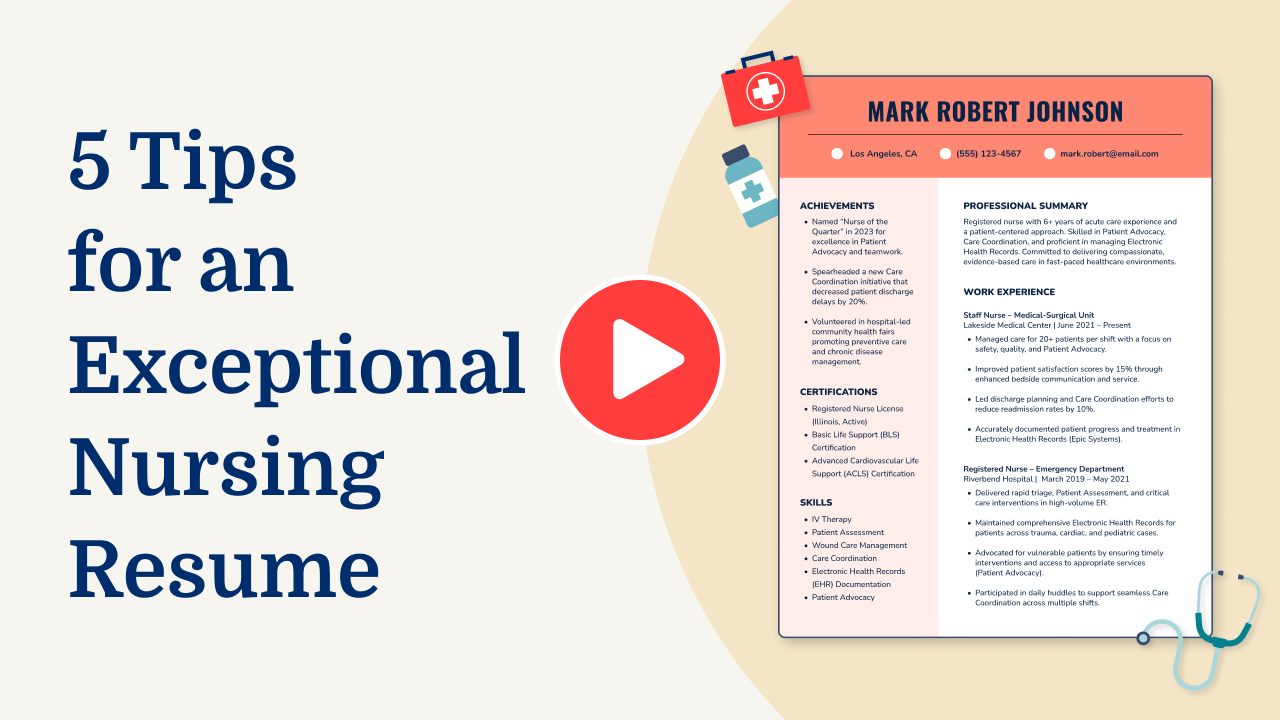
Write a strong professional summary
A professional summary and a resume objective on a resume introduce you to hiring managers by providing a snapshot of who you are and what you bring. To start, you need to decide whether a summary or an objective is better suited for your resume.
A professional summary should be three to four sentences that highlight your experience, skills, and achievements. It’s ideal for experienced applicants as it showcases your professional identity and value. In this section, emphasize your accomplishments as a school nurse.
On the other hand, resume objectives state career goals and are effective for entry-level applicants, career changers, or those with employment gaps. Think of it as “what I’ve accomplished” versus “what I aim to contribute.”
Next, let’s go through examples of both summaries and objectives tailored to various experience levels.
School nurse resume summary examples
Entry-level
Recent nursing graduate with a Bachelor of Science in Nursing (BSN) and certified as a Registered Nurse (RN). Completed clinical rotations in pediatric care, health assessments, and immunization management. Skilled in basic first aid, maintaining accurate medical records, and fostering positive relationships with students and staff. Enthusiastic about promoting student wellness and creating safe school environments.
Mid-career
School nurse with over five years of experience providing healthcare services in educational settings. Experienced in managing chronic conditions, administering medications, conducting health screenings, and developing individualized care plans for students. Certified in pediatric advanced life support (PALS) and asthma education programs. Recognized for collaborative work with educators to improve student health outcomes.
Experienced
Veteran school nurse with more than 15 years of expertise leading school-wide health initiatives and managing complex medical needs within diverse student populations. Advanced certifications in diabetes care management and mental health first aid. Proven ability to train staff on emergency procedures, implement public health campaigns, and advocate for comprehensive wellness policies across districts.
School nurse resume objective examples
Recent graduate
Compassionate and dedicated recent Bachelor of Science in Nursing graduate seeking a school nurse position to apply clinical skills and knowledge in a supportive educational environment. Committed to fostering a healthy school community by providing quality care and promoting wellness among students.
Career changer
Enthusiastic professional transitioning from general healthcare into school nursing, with strong interpersonal skills and experience in child health education. Keen to contribute to the well-being of students by leveraging patient care experience and adaptability in a collaborative school setting.
Specialized training
Registered Nurse with specialized training in pediatric care seeking a role as a school nurse. Aims to use expertise in child health management and emergency response to ensure the safety and wellness of the student population while supporting educational initiatives.
Using a AI Resume Builder can help school nurses easily create a neat and organized resume by choosing templates that highlight important skills like communication and first aid.
Include relevant certifications and training
Listing certifications and training for a school nurse is important because it shows you have the right skills and knowledge to take care of students. Schools want nurses who are ready for emergencies and can handle health issues safely.
By showing your credentials, you make it clear that you’re qualified and trustworthy. A certifications section on your resume helps highlight these skills. Relevant certifications for a school nurse include:
- Registered nurse (RN) license
- Certified school nurse (CSN)
- Basic life support (BLS) certification
- Pediatric advanced life support (PALS) certification
- First aid and CPR training
Adding these certifications to your resume can help schools see that you’re prepared for the job. It makes you stand out as someone who has taken extra steps to be ready for various situations in a school setting. This section can be a great addition next to your education details.
Example of a certifications section
Registered Nurse (RN) License
Issued by: State Board of Nursing
Certified School Nurse (CSN)
Issued by: National Board for Certification of School Nurses (NBCSN)
Pediatric Advanced Life Support (PALS)
Issued by: American Heart Association
Basic Life Support (BLS) for Healthcare Providers
Issued by: American Red Cross
For nursing roles, choose a resume template with a simple, professional design rather than an overly decorative one. This approach ensures you present a polished image that can set you apart.
Showcase your work experience
When applying for a job as a school nurse, it’s important to present your work experience in a way that stands out. Listing your jobs in reverse-chronological order helps employers quickly see your most recent and relevant experiences. Begin each entry with your job title, followed by the employer’s name, location, and dates of employment.
Use clear and action-oriented language to describe your roles at each job. Rather than just listing duties, focus on how you made a difference. For example, if you developed health programs that improved student wellness or managed emergency situations effectively, be sure to highlight these contributions.
Emphasizing measurable results is key to demonstrating your impact. If you reduced the number of student illnesses through health initiatives or increased vaccination compliance by organizing immunization drives, include these achievements. When detailing core responsibilities as a school nurse, mention skills like:
- Assessing student health needs
- Maintaining medical records
- Administering medications safely
- Providing first aid care
By presenting relevant experience clearly and effectively, you’ll give potential employers insight into why you’re an ideal fit for their team. Ensure each point reflects your ability to support students’ health and well-being in meaningful ways.
5 school nurse work history bullet point examples
- Administered first aid and emergency care to students and staff, reducing incident response time by 40%.
- Developed and implemented a health education program for 500 students, improving awareness of healthy practices by 25%.
- Conducted over 1,000 screenings for vision, hearing, and scoliosis annually, ensuring early detection and intervention.
- Managed health documentation and immunization compliance for a student body of 800, maintaining a 100% compliance rate.
- Collaborated with teachers and parents to create individualized healthcare plans for students with chronic conditions, improving their school attendance by 15%.
For school nurses, select a resume format that highlights your medical skills, experience with children, and ability to handle emergencies.
Match your resume with the job description
Tailoring your resume to the job description is essential because it ensures your application aligns with what employers are seeking. By learning how to customize your resume, you increase the chances of standing out and passing through applicant tracking systems (ATS), which scan for specific keywords and phrases from job postings.
An ATS-friendly resume includes relevant keywords and phrases that match the skills and qualifications listed in the job description. This strategy helps hiring managers quickly see you as a strong fit for the role, improving your chances of advancing to an interview.
To identify these important keywords, carefully review the job posting for repeated skills, qualifications, or duties. For example, a school nurse position might emphasize “student health assessments,” “emergency care,” or “collaborating with educators.” Including such exact terms signals that you understand the role’s requirements.
Integrate these keywords naturally into your content by tying them to your experience. If a description states “Provide health education to students,” you could phrase it as “Delivered health education sessions to promote student wellness.” This approach keeps your resume authentic while aligning with employer expectations.
Targeted resumes not only improve ATS compatibility but also demonstrate how your unique skills meet specific needs. By crafting thoughtful content tailored to each opportunity, you improve both visibility and appeal for potential employers.
Don’t let ATS software stop you from getting your dream job! Our ATS Resume Checker makes sure your resume is formatted right and has the right keywords.
FAQ
Do I need to include a cover letter with my school nurse resume?
Yes, including a well-written cover letter with your school nurse resume can boost your application and increase your chances of securing an interview.
A cover letter lets you express your passion for working in a school setting while highlighting relevant experience, such as managing student health records or coordinating with educators on health education.
If the school has specific health programs or initiatives, discuss how your background aligns with these efforts.
Consider using our Cover Letter Generator to craft a personalized cover letter that highlights your qualifications or explore our collection of cover letter examples for inspiration tailored to healthcare roles.
This approach ensures you effectively convey your unique suitability for the school nurse position.
How long should a school nurse resume be?
For a school nurse, a one-page resume is often enough to present key qualifications like nursing certifications, experience with children, and knowledge of school health protocols. This format lets you highlight important skills without overwhelming the reader.
If you have extensive experience or specialized certifications related to school nursing, a two-page resume might be suitable. Ensure every detail adds value by showcasing leadership in health initiatives or achievements in student care.
Consider exploring more about how long a resume should be for insights into tailoring your resume’s length effectively.
How do you write a school nurse resume with no experience?
Crafting a resume with no experience as a school nurse involves focusing on your education, certifications, and transferable skills. Highlight these aspects effectively to make your application stand out from others competing for the role.
- Emphasize your education and certifications: Start with your nursing degree, including the institution’s name and graduation date. Ensure you list any relevant certifications like RN licensure or CPR/First Aid training.
- Leverage clinical rotations or volunteer work: If you’ve completed clinical placements in school settings or volunteered in health-related roles, detail these experiences to showcase applicable skills such as administering first aid, managing student health records, and collaborating with educators.
- Showcase transferable skills: Highlight skills gained from other jobs or extracurricular activities that are valuable in a school setting—such as communication, organization, problem-solving abilities, or experience working with children.
For more strategies on crafting an effective resume with no experience specifically for a school nurse position, consider checking resources tailored for entry-level healthcare professionals.
Rate this article
School Nurse
Share this page
Additional Resources
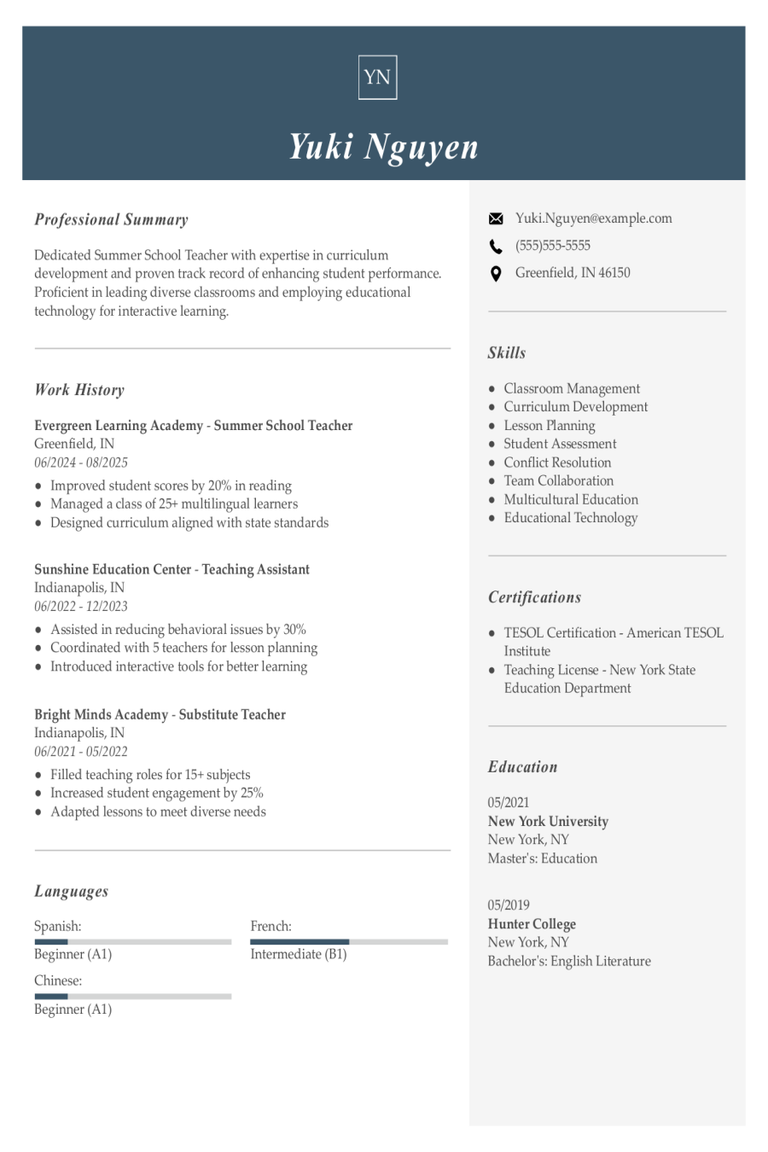
Summer School Teacher Resume Examples & Templates
Explore summer school teacher resume examples that focus on classroom management, lesson planning, and student engagement. Discover tips to show employers you’re creative, patient, and ready to inspire students.Build my
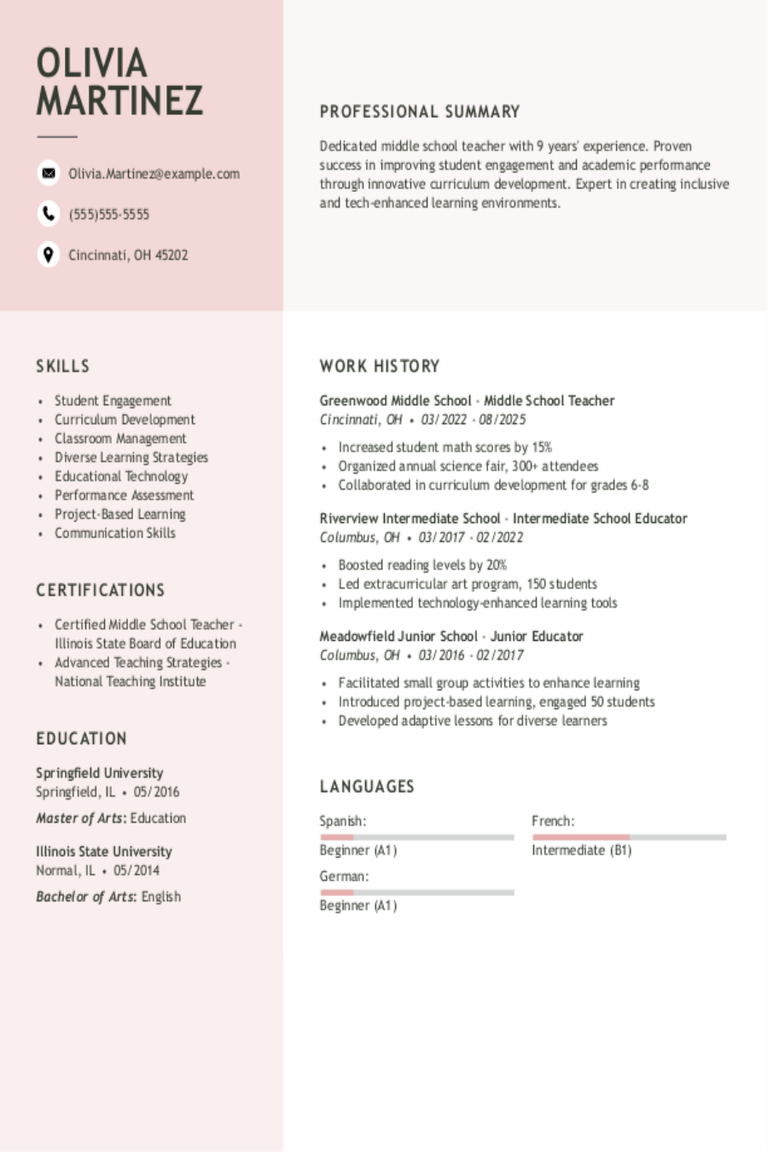
Middle School Teacher Resume Examples & Templates
Explore middle school teacher resume examples to see how to highlight your experience engaging young students, planning lessons, and managing classrooms. These examples and tips help you spotlight your teaching
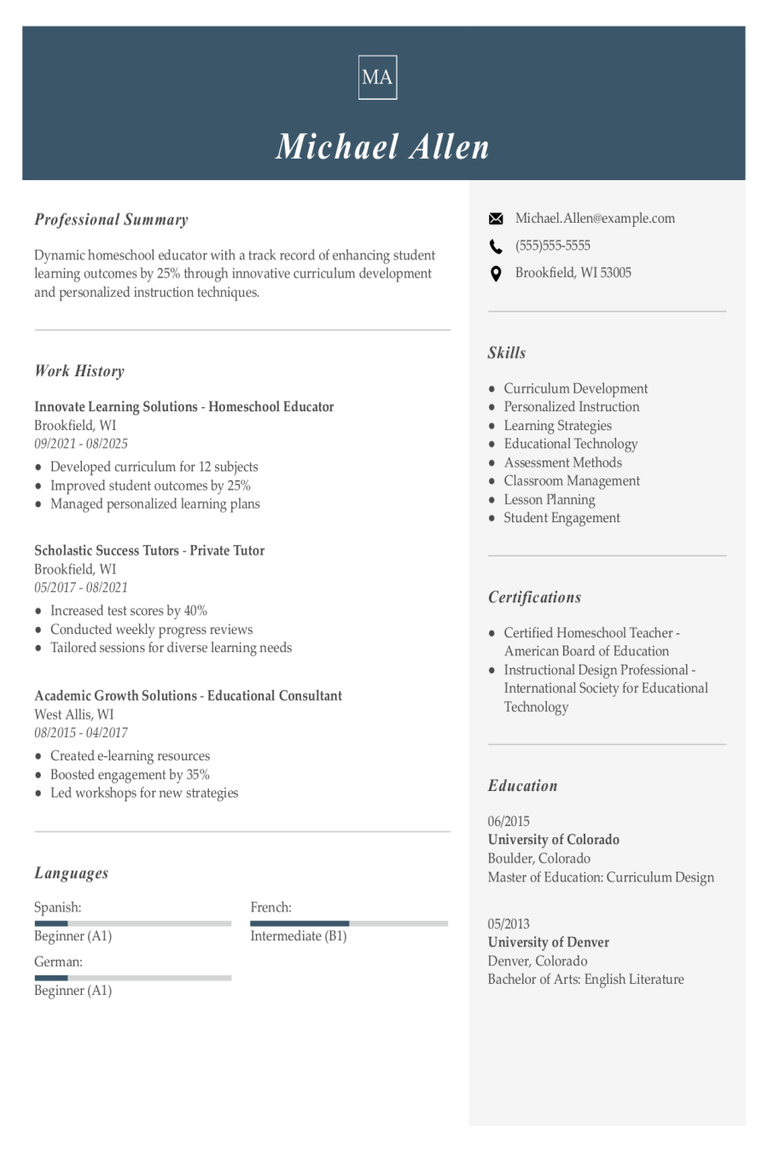
Homeschool Teacher Resume Examples & Templates
Looking to build a standout homeschool teacher resume? Our examples and tips will guide you in showcasing your teaching skills, curriculum planning, and ability to create engaging learning environments.Build my
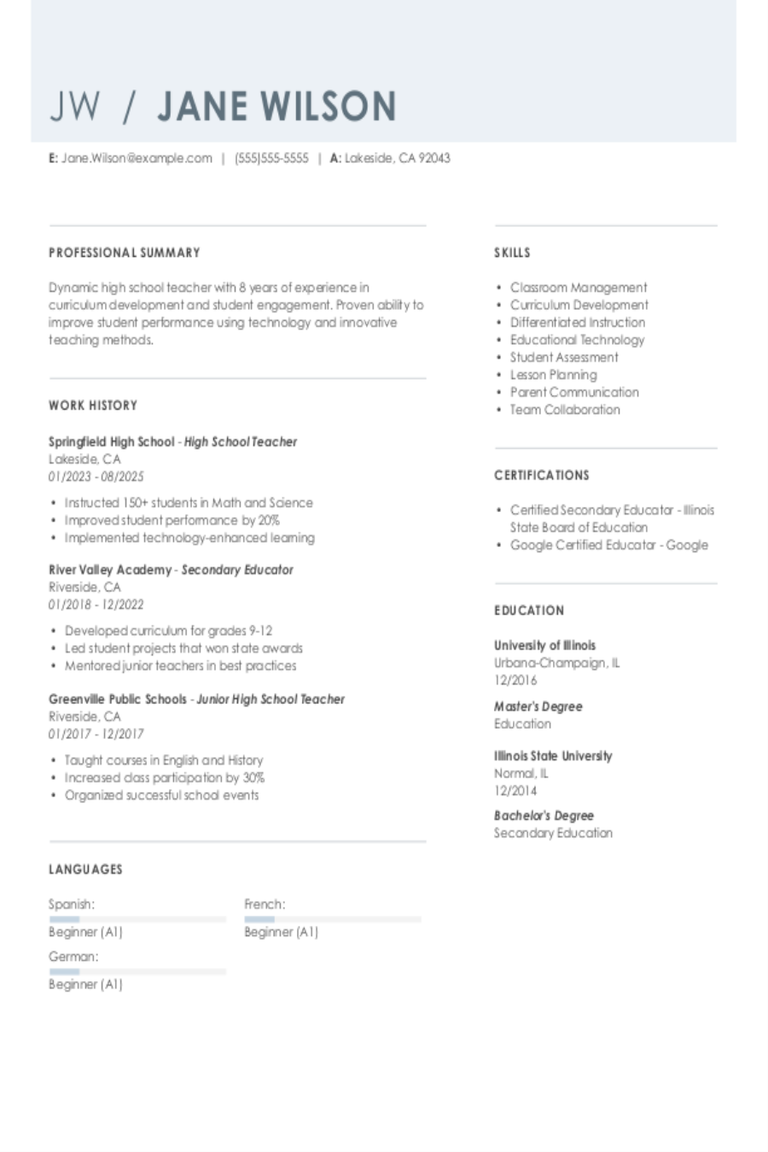
High School Teacher Resume Examples & Templates
Explore high school teacher resume examples that focus on engaging students and managing classroom activities. These tips will help you show off your teaching skills and highlight your relevant experience
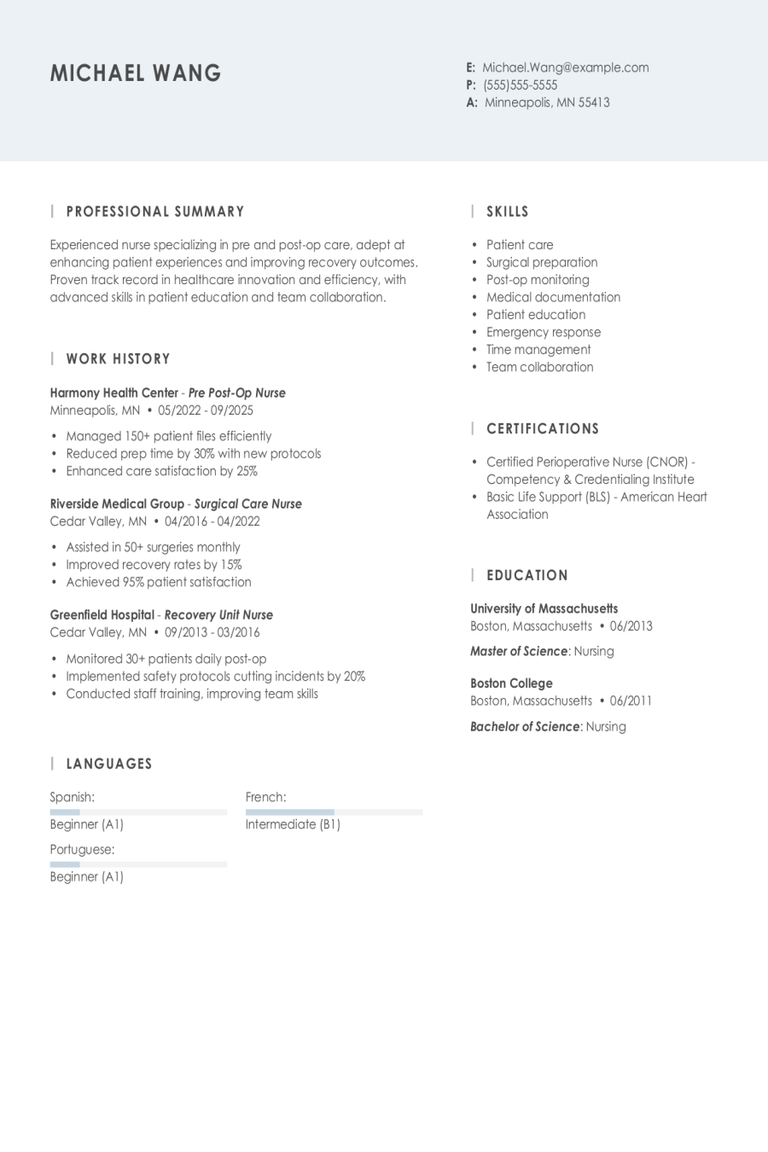
Pre Op/Post Op Nurse Resume Examples & Templates
These pre op/post op nurse resume examples show how to highlight your skills in patient care and surgical prep. Learn tips for showcasing your experience and making your qualifications stand
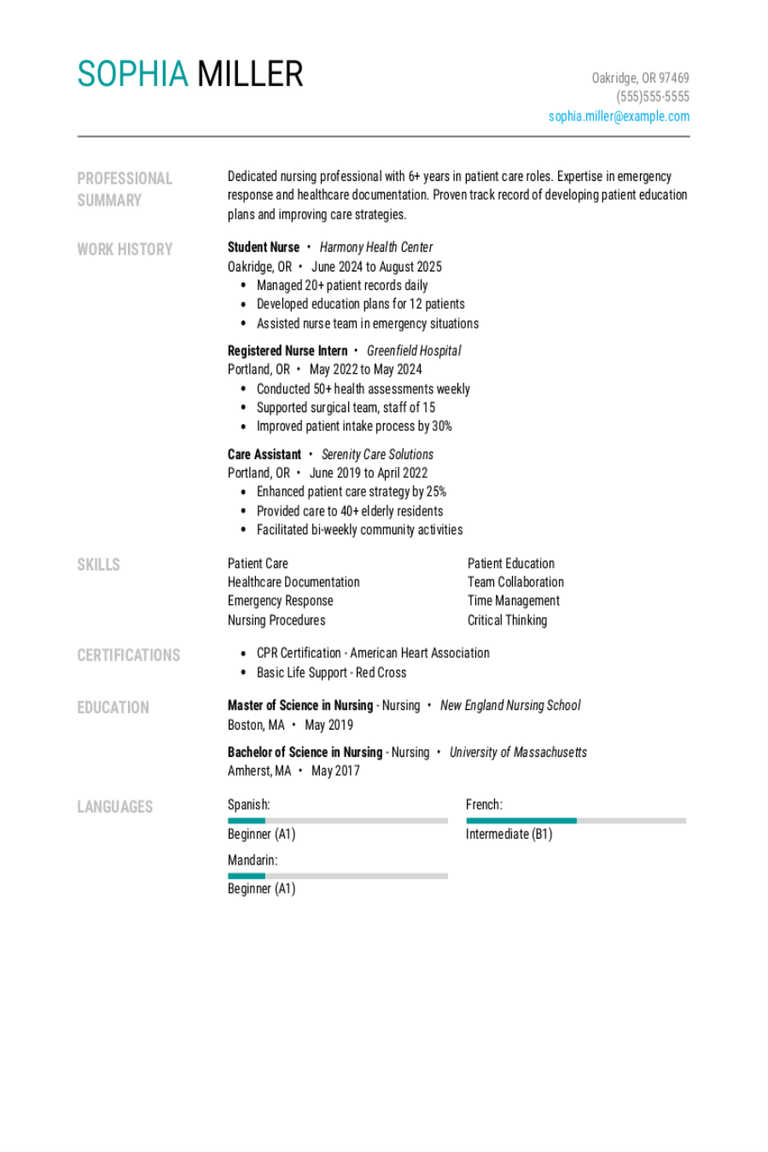
Student Nurse Resume Examples & Templates
Discover student nurse resume examples that show off patient care, teamwork, and time management. Learn how to present your skills and experiences to stand out in the healthcare field.Build my
